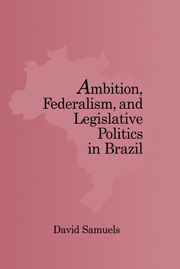Book contents
- Frontmatter
- Contents
- List of Tables and Figures
- Abbreviations and Acronyms
- Acknowledgments
- Introduction
- SECTION I
- SECTION II
- 5 The “Gubernatorial Coattails Effect”: Federalism and Congressional Elections in Brazil
- SECTION III
- Conclusion
- Appendix 1 Coding of Political Positions by Level of Government
- Appendix 2 List of Interviews
- References
- Author Index
- Subject Index
5 - The “Gubernatorial Coattails Effect”: Federalism and Congressional Elections in Brazil
Published online by Cambridge University Press: 28 July 2009
- Frontmatter
- Contents
- List of Tables and Figures
- Abbreviations and Acronyms
- Acknowledgments
- Introduction
- SECTION I
- SECTION II
- 5 The “Gubernatorial Coattails Effect”: Federalism and Congressional Elections in Brazil
- SECTION III
- Conclusion
- Appendix 1 Coding of Political Positions by Level of Government
- Appendix 2 List of Interviews
- References
- Author Index
- Subject Index
Summary
“Stumping for candidates is a thing of the past, it's a figure of speech. These days, if you advertise that you're going to vote for this guy or that guy, it doesn't change anything.”
—-Brazilian President Fernando Henrique Cardoso, expressing his belief that presidential coattail effects do not exist in Brazil“If every politician's first rule is to survive, then we reach the following conclusion: it is useless to discuss national issues in the electoral process.”
—-Nelson Jobim, two-term federal deputy, former Minister of Justice, and current Supreme Court JusticeINTRODUCTION
In January 1999, Fernando Henrique Cardoso became the first Brazilian president in history to pass the presidential sash to himself. He won a smashing first-round reelection victory in October 1998, defeating his nearest rival by over 20 percent, and the parties in his alliance also won sizeable majorities in both houses of Congress. By all rights, Cardoso's reelection ought to have rejuvenated his efforts to maintain Brazil's economic stabilization program (the Plano Real) and to pass extensive political reforms. On top of the prestige due from his relatively easy victory, soon after the election the IMF agreed to provide Brazil with U.S.$42 billion to give Cardoso extra political and economic breathing room to maneuver for reform. Superficially, President Cardoso appeared to possess significant political capital upon the start of his second term.
However, Cardoso experienced no “second honeymoon.” Quite the contrary; his second term began as a nightmare.
- Type
- Chapter
- Information
- Ambition, Federalism, and Legislative Politics in Brazil , pp. 79 - 108Publisher: Cambridge University PressPrint publication year: 2003
- 2
- Cited by

